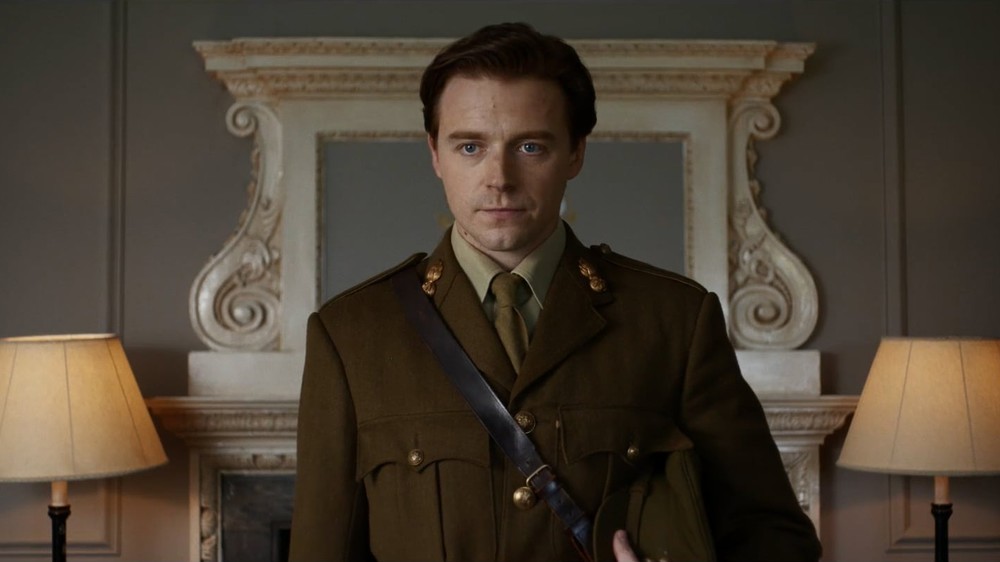Help keep The Curb independent by joining our Patreon.
Liverpudlian director Terence Davies once again turns his intimate filmmaking focus to investigate the life of a poet. As he did in his imaginative biographical film of Emily Dickinson A Quiet Passion, Davies grapples with the life of a writer never fully understood in their time who lives in a kind of self-imposed isolation stemming from their inability to reconcile what it is to live and be alive.
Benediction impressionistically chronicles the life of queer poet Siegfried Sassoon (played in youth by Jack Lowden and in old age by Peter Capaldi). Sassoon is best remembered for his blistering and heartrending poetry about the mass slaughter that was WWI. What is less known about him is his struggle to overcome his personal demons in part created by his harrowing experiences of the war and having to live as a queer man in a society where his sexuality is reviled.
The film opens with a young Sassoon attending a Stravinsky concert with his brother Hamo. As the curtain rises we do not see the concert but a newsreel memory of Cambridge students rowing. A golden age soon turns dark as Siegfried and Hamo enlist to fight. Only Siegfried will return from the battlefield and his experiences there lead him to write an anti-war invective that risks him being court martialled.
From a minorly prominent family, Sassoon is spared from the court martial by his friend and mentor Robbie Ross (Simon Russell Beale) and is instead sent to a military hospital to be treated for “shell shock.”

Whilst he is in hospital he meets Dr Rivers (Ben Daniels) a man that gently takes a fatherly role in Sassoon’s life. Rivers is also homosexual and encourages Sassoon to embrace his life and writing. Also whilst at the hospital he meets and mentors the poet Wilfred Owen (Matthew Tennyson). Davies implies that Siegfried has fallen in love with the young man but at this stage of his life his affair with men remain chaste. Heartbroken that Owen is returned to the front (from which he will never return) Sassoon feels an overwhelming loneliness that he will never conquer.
Davies chooses not to film Sassoon or his contemporaries in the trenches but rather relies on newsreel footage and photographs of soldiers during the war. The choice is inspired as it makes the audience interact with the true tragedy of the War to End All Wars. Never showing Sassoon in battle means that the perspective of the experience becomes more universal and is not limited to the character. Employing Lowden’s Sassoon to read his poetry (and at one stage Wilfred Owen’s) over the montages highlights both the travesty of a wasteful war but also Sassoon’s immense talent.
The film turns to Sassoon’s life after the war – one which is filled with empty socialising and a retinue of London’s demi monde including people like Edith Sitwell and Ottoline Morrell. The shallowness of this time is harshly contrasted to the weight of Sassoon’s continued trauma. At a salon hosted by some society doyenne Sassoon recites on of his poems after a performance by Ivor Novello (Jeremy Irvine). The room sits in uncomfortable silence after Sassoon’s poem and immediately turns in relief when Novello starts playing his popular tunes again.
Siegfried meeting Novello becomes a turning point for the poet. The two become lovers despite the gap between them in terms of art and emotional availability. Jeremy Irvine’s Novello is a cruel and narcissistic man who relishes tormenting his lovers. As the affair ends with Novello coldly rejecting Siegfried there is a sense that Siegfried sees relationships to be a painful and humiliating experience. His longer-term relation with society gadfly Stephen Tennant (Calam Lynch) is equally dysfunctional. Siegfried debases himself to stave off loneliness. There are a few moments when it seems he may find something more promising with Novello’s ex-lover Glen Byam Shaw (Tom Blyth) but that is cut off when he finds out Shaw has chosen to marry (as many homosexual men did).
Siegfried himself decides to marry. He is drawn to the young socialite Hester Gatty (played in youth by Kate Phillips and in older age by Gemma Jones). Once again Siegfried invests himself into another person, making the claim to Hester that she is his future. He makes the claim once again about his son George. Davies’ script needs us to understand that Sassoon is always relying on others to validate his sense of self, and as his relationships including his marriage deteriorate what is left behind is lingering bitterness.
Peter Capaldi’s version of Sassoon is a man who is completely lost. At odds with his son and the new generation that has forgotten him, he lives in obscurity. His only hope is to once again look for outside affirmation, in this case a conversion to the Catholic Church.
Melancholy permeates Davies’ film, and the non-linear structure of the piece serves to heighten its elegiac tone. Sassoon is a complex character – there is much to dislike in him as there is to admire in him. As much as he is a victim of his own self-loathing, he also craves fame and recognition. It is to Jack Lowden’s immense credit that he is able to balance these aspects of the character with a simply astounding performance.
There is a deep nuance to Davies’ work on Benediction that asks the audience to consider the life of a damaged man with respect for him despite his flaws. The film also acts as a tone poem in itself to Sassoon’s life. Although Davies’ script takes some liberties with Sassoon’s biographical details he constructs a vision of not only the author but a generation of men who in some manner never returned from the battlefield. It is also an examination of the lives of queer men at the time. Sassoon and his social circle certainly had more freedom to express their sexuality because of their class, but it was still dangerous as Davies’ reminds us by mentioning Robbie Ross’ defence of Oscar Wilde.
Terence Davies, himself a queer man, has given Siegfried Sassoon an elegant and moving biography that in strokes both broad and intimate paints the picture of a broken soul seeking recognition in all aspects of his life and failing to comprehend that he was enough on his own. Benediction is achingly sad but poignant – like all great art it elicits empathy for the subject and the many, many young men who were lost due to wars out of their control; whether those be on a battlefield or in their personal lives.
Director: Terence Davies
Cast: Tom Blyth, Jack Lowden, Kate Phillips
Writer: Terence Davies
Producers: Deborah Aston, Michael Elliott
Cinematography: Nicola Daley
Editor: Alex Mackie



